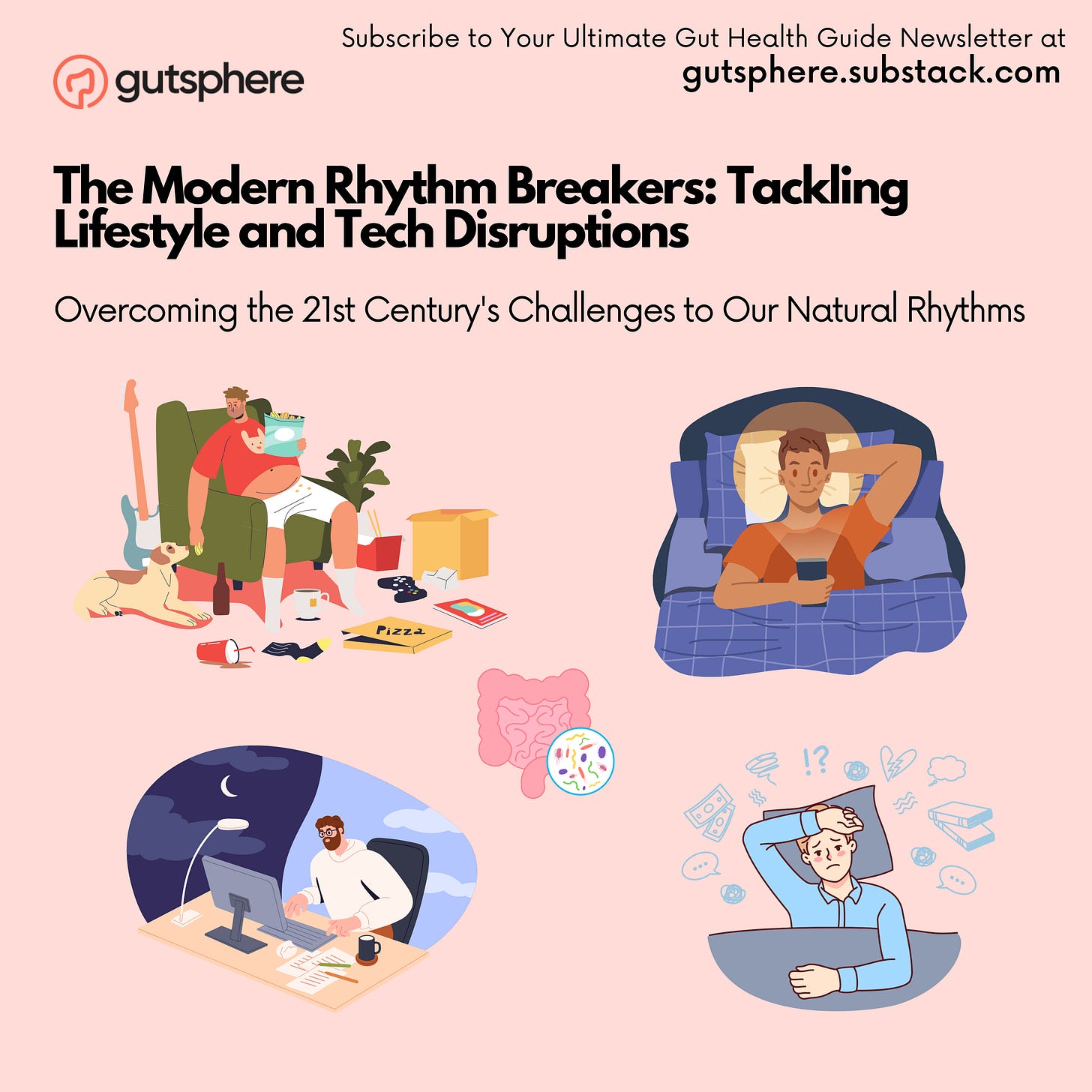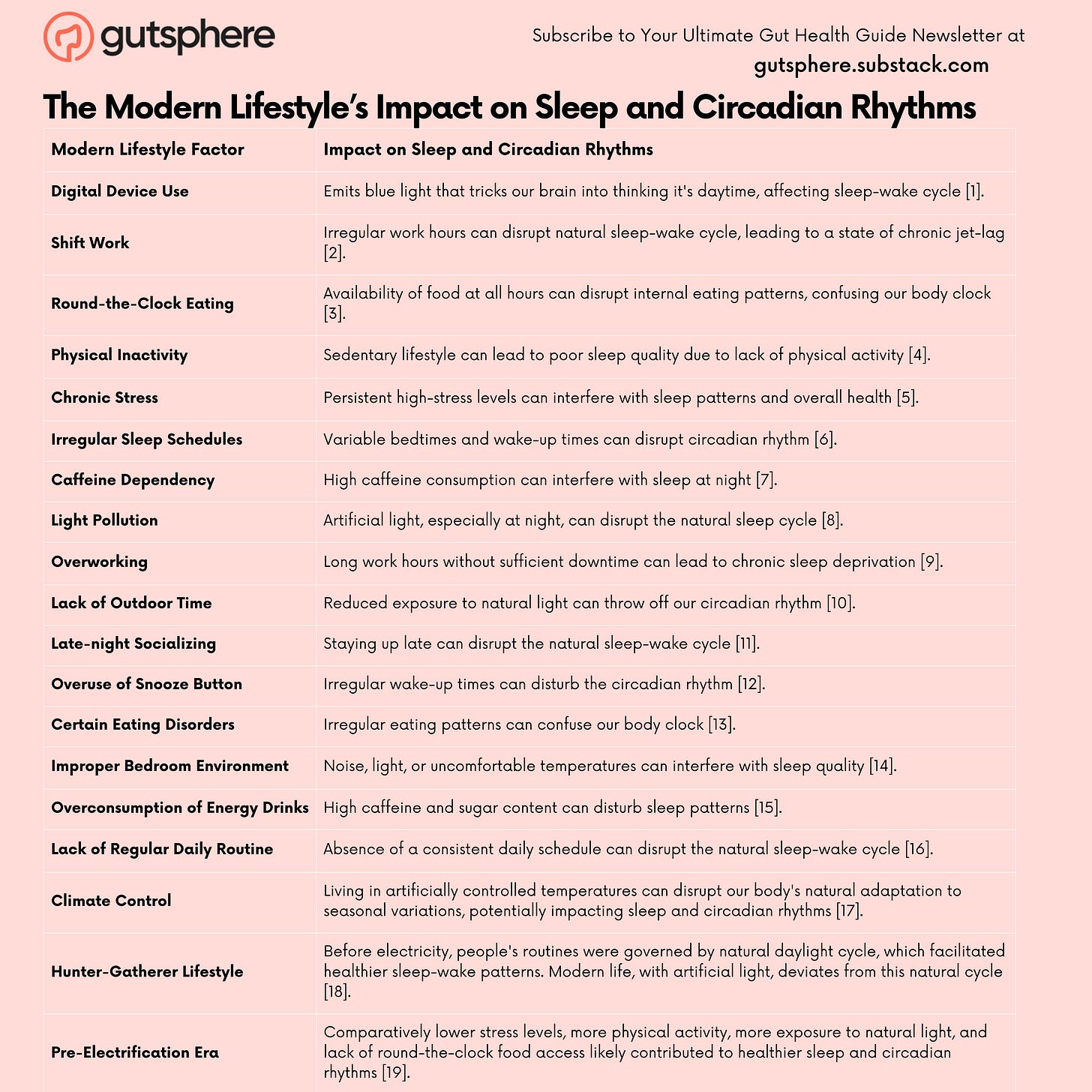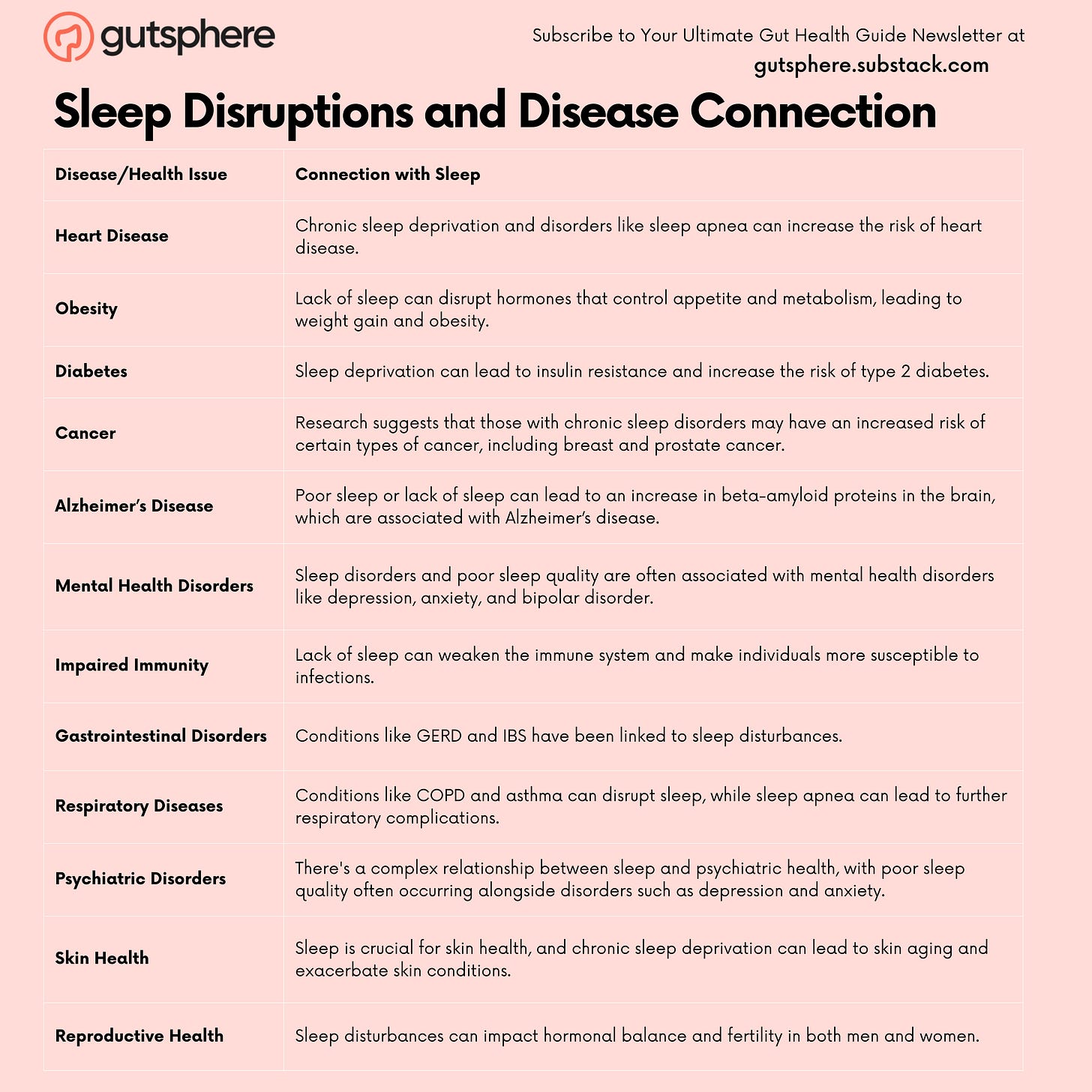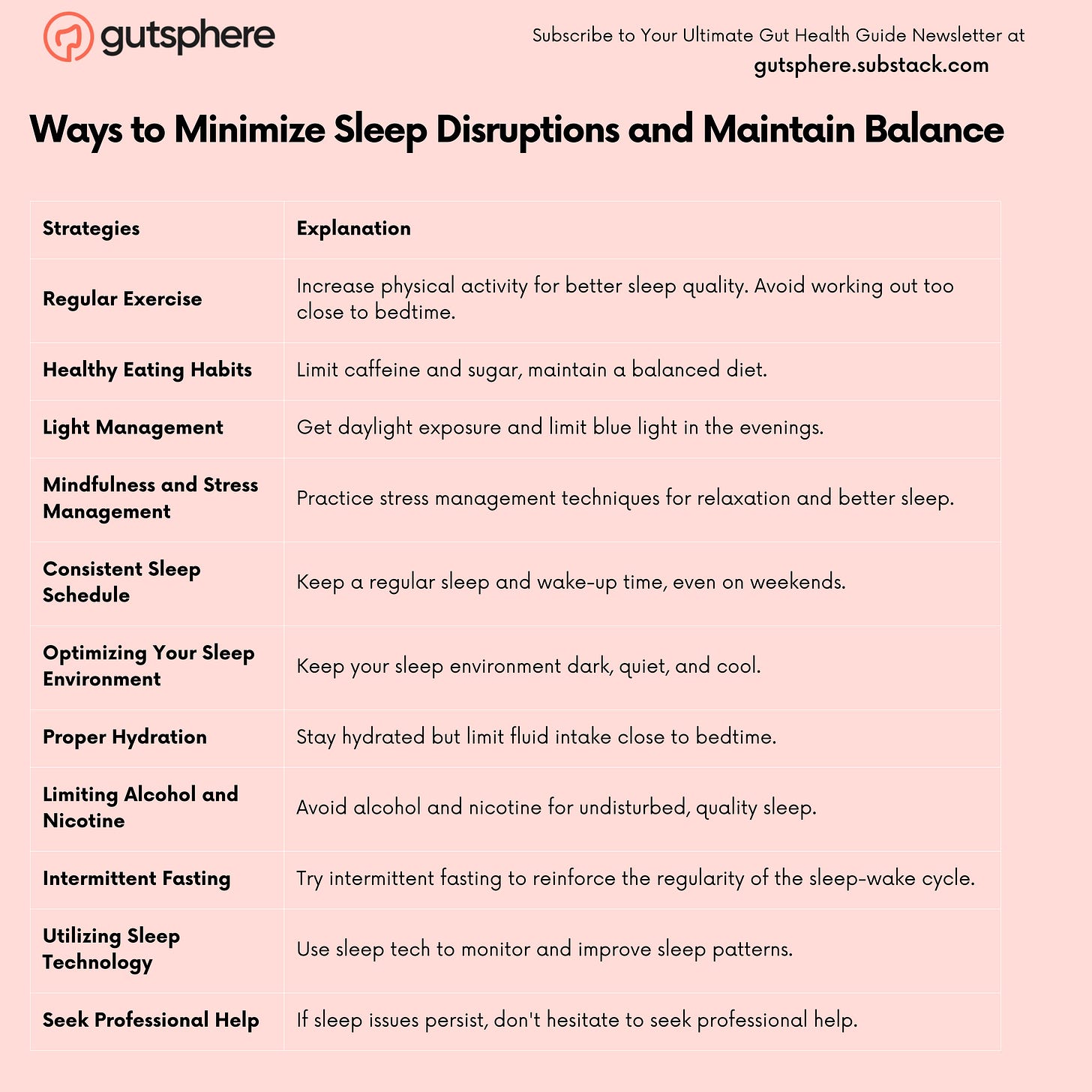The Modern Rhythm Breakers: Tackling Lifestyle and Tech Disruptions
Overcoming the 21st Century's Challenges to Our Natural Rhythms
Hello GutSphere community!
Welcome to Part 5 of our journey into the intriguing world of circadian rhythms, sleep, and gut health. In this section, we take on a topic that's very relevant to all of us in this fast-paced, high-tech world - the influence of modern lifestyle and technology on our sleep and circadian rhythms.
We're all a part of the 21st-century rhythm, where long work hours, constant digital engagement, and erratic schedules often leave us out of sync with our natural bodily rhythms. These disruptions, while often overlooked, can significantly impact our sleep and gut health.
But fret not, because awareness is the first step towards improvement. As we unravel the effects of our modern lifestyles, we'll also explore the connection between sleep disruptions and disease and provide practical strategies to minimize these disruptions.
Armed with this knowledge, we can navigate our modern world while honoring the ancient rhythms that keep us healthy. So let's dive in, understand the challenges, and uncover the solutions to maintain our internal balance amidst the hustle and bustle of the 21st century! Let's take control of our health, one rhythm at a time!
The Modern Lifestyle’s Impact on Sleep and Circadian Rhythms
Modern life, with its array of technological advancements and societal shifts, has dramatically altered our routines and habits. Let's examine some of these lifestyle changes that may be subtly affecting our circadian rhythms:
Digital Device Use: Our relationship with technology, especially the screens that pervade our lives, can emit blue light, convincing our brains it's still daytime, long after the sun has set [1].
Shift Work: Irregular work hours interrupt our natural sleep-wake cycle and can lead to a state of chronic jet-lag [2].
Round-the-Clock Eating: The convenience of 24/7 access to food and late-night snacking can disrupt our internal eating patterns and confuse our body clock [3].
Physical Inactivity: Our predominantly sedentary modern lifestyle can result in poor sleep quality due to inadequate physical activity [4].
Chronic Stress: Persistent high-stress levels, whether from work or personal circumstances, can interfere with our sleep patterns and overall health [5].
Irregular Sleep Schedules: Variable bedtimes and wake-up times can throw our circadian rhythm into disarray [6].
Caffeine Dependency: While coffee or energy drinks might seem like our best friend during a long day, they can interfere with our sleep at night [7].
In addition to these, our modern lifestyles are also influenced by factors such as light pollution, overworking, lack of outdoor time, late-night socializing, overuse of the snooze button, certain eating disorders, improper bedroom environments, noise pollution, overconsumption of energy drinks, and lack of a regular daily routine [8].
When these lifestyle factors overlap and intertwine, they can accumulate and push our circadian rhythms over a tipping point, significantly disrupting our sleep and overall health [9]. These disruptions are not trivial. They can lead to serious health conditions such as obesity, diabetes, cardiovascular diseases, and even some types of cancer [10].
In comparison, the lives of our hunter-gatherer ancestors or even those living before the widespread use of electricity were significantly different:
Light Exposure: They lived by the sun's schedule, waking up at dawn and going to sleep after dusk. In contrast, artificial light enables us to stay awake till the early morning hours, thereby disrupting our natural sleep cycle [11].
Activity Levels: Hunter-gatherers led physically demanding lives, contributing to good sleep quality. With modern sedentary lifestyles, however, physical inactivity can result in poor sleep [12].
Food Availability: They consumed seasonal, locally available food with periods of feast and famine. Our 24/7 access to food disrupts these natural eating patterns, affecting our circadian rhythms [13].
Stress Levels: They faced acute stressors such as predator attacks or food shortages, while we grapple with chronic stressors like job pressures or financial issues, which can drastically impact our sleep [14].
Nature Connection: They were closely connected with nature, with daily rhythms in sync with the natural world. In contrast, modern life often lacks this connection, leading to potential circadian disruptions [15].
In conclusion, our modern lifestyles have far-reaching impacts on our sleep and circadian rhythms. However, awareness is the first step towards change. By identifying these lifestyle factors, we can take proactive steps to mitigate their effects and prioritize our health. After all, it's about finding balance and rhythm amidst the whirlwind of modern life.
Remember, your sleep is crucial, and your circadian rhythm is the silent orchestrator behind the scenes. So, here's to making conscious decisions for better sleep and better health! Stay tuned for our next section where we'll delve into the connection between sleep and disease and explore ways to minimize these modern disruptions and maintain balance in our lives.
References:
Touitou, Y., Reinberg, A., & Touitou, D. (2017). Association between light at night, melatonin secretion, sleep deprivation, and the internal clock: Health impacts and mechanisms of circadian disruption.https://pubmed.ncbi.nlm.nih.gov/28214594/
Kecklund, G., & Axelsson, J. (2016). Health consequences of shift work and insufficient sleep. BMJ, 355. https://www.bmj.com/content/355/bmj.i5210
McHill, A. W., Phillips, A. J., Czeisler, C. A., Keating, L., Yee, K., Barger, L. K., ... & Klerman, E. B. (2017). Later circadian timing of food intake is associated with increased body fat. The American Journal of Clinical Nutrition, 106(5), 1213-1219. https://pubmed.ncbi.nlm.nih.gov/28877894/
Chennaoui, M., Arnal, P. J., Sauvet, F., & Léger, D. (2015). Sleep and exercise: a reciprocal issue?. Sleep Medicine Reviews, 20, 59-72. https://www.sciencedirect.com/science/article/abs/pii/S1087079214000720
Prather, A. A., Puterman, E., Lin, J., O'Donovan, A., Krauss, J., Tomiyama, A. J., ... & Epel, E. S. (2011). Shorter leukocyte telomere length in midlife women with poor sleep quality. Journal of Aging Research, 2011. https://www.ncbi.nlm.nih.gov/pmc/articles/PMC3199186/
Phillips, A. J., Clerx, W. M., O'Brien, C. S., Sano, A., Barger, L. K., Picard, R. W., ... & Klerman, E. B. (2017). Irregular sleep/wake patterns are associated with poorer academic performance and delayed circadian and sleep/wake timing. Scientific Reports, 7(1), 1-13. https://www.nature.com/articles/s41598-017-03171-4
Clark, I., & Landolt, H. P. (2017). Coffee, caffeine, and sleep: A systematic review of epidemiological studies and randomized controlled trials. Sleep Medicine Reviews, 31, 70-78. https://pubmed.ncbi.nlm.nih.gov/26899133/
Bedrosian, T. A., & Nelson, R. J. (2013). Influence of the modern light environment on mood. Molecular Psychiatry, 18(7), 751-757. https://www.nature.com/articles/mp201370
Bannai, M., & Tamakoshi, A. (2014). The association between long working hours and health: a systematic review of epidemiological evidence. Scandinavian Journal of Work, Environment & Health, 5-18. https://pubmed.ncbi.nlm.nih.gov/24100465/
LeGates, T. A., Fernandez, D. C., & Hattar, S. (2014). Light as a central modulator of circadian rhythms, sleep and affect. Nature Reviews Neuroscience, 15(7), 443-454. https://pubmed.ncbi.nlm.nih.gov/24917305/
Roenneberg, T., Kantermann, T., Juda, M., Vetter, C., & Allebrandt, K. V. (2013). Light and the human circadian clock. In Handbook of Experimental Pharmacology (pp. 311-331). https://pubmed.ncbi.nlm.nih.gov/23604485/
Samson, D. R., Crittenden, A. N., Mabulla, I. A., Mabulla, A. Z., & Nunn, C. L. (2017). Chronotype variation drives night-time sentinel-like behaviour in hunter–gatherers. https://pubmed.ncbi.nlm.nih.gov/28701566/
Power, M. L., & Schulkin, J. (2009). Sex differences in fat storage, fat metabolism, and the health risks from obesity: possible evolutionary origins. British Journal of Nutrition, 101(10), 1456-1465. https://pubmed.ncbi.nlm.nih.gov/17977473/
McEwen, B. S. (2007). Physiology and neurobiology of stress and adaptation: central role of the brain. Physiological Reviews, 87(3), 873-904. https://journals.physiology.org/doi/full/10.1152/physrev.00041.2006
Korte, S. M., Koolhaas, J. M., Wingfield, J. C., & McEwen, B. S. (2005). The Darwinian concept of stress: benefits of allostasis and costs of allostatic load and the trade-offs in health and disease. Neuroscience & Biobehavioral Reviews, 29(1), 3-38. https://www.sciencedirect.com/science/article/abs/pii/S0149763404001484
Sleep and Disease Connection
As we journey into the intriguing world of sleep, it's essential to underscore the profound connection between sleep and our health. If sleep was a mysterious realm, then diseases are the unwanted adversaries lurking in the shadows, waiting to strike when our guard — in this case, our quality sleep — is down. From our hearts to our brains, sleep influences the functioning of virtually every system within our bodies.
Cardiovascular Disease: Sleep deprivation can lead to higher levels of cortisol (the stress hormone), which causes increased blood pressure, a risk factor for heart disease and stroke.
Diabetes: Poor sleep can lead to insulin resistance, leading to higher blood sugar levels and potentially type 2 diabetes.
Obesity: Sleep deprivation can cause hormonal imbalances, including those that regulate appetite, leading to overeating and weight gain.
Depression and Anxiety: Lack of sleep can contribute to mental health disorders, including depression and anxiety.
Alzheimer's Disease: During sleep, the brain clears away harmful waste proteins that build up between its cells - poor sleep has been linked to higher levels of these proteins and increased risk of Alzheimer's disease.
Immune Function: Sleep has been found to directly impact the functioning of our immune system. Chronic sleep deprivation can weaken the immune system, making you more susceptible to infections.
Cancer: There is growing evidence suggesting that chronic circadian disruption, typically experienced as poor sleep or night shift work, may be associated with an increased risk of breast, prostate, and colorectal cancers.
Gastrointestinal Disorders: Conditions such as gastroesophageal reflux disease (GERD) and inflammatory bowel disease (IBD) have been found to have strong links with sleep disturbances.
Respiratory Diseases: Sleep apnea and chronic obstructive pulmonary disease (COPD) can result in disrupted sleep, while, conversely, chronic insomnia can increase the risk of developing these conditions.
Psychiatric Disorders: Conditions such as depression, anxiety, and bipolar disorder have a complex relationship with sleep. Sleep disturbances often occur alongside these conditions and can exacerbate their symptoms.
Skin Health: Skin diseases like psoriasis and eczema are often accompanied by sleep disturbances. Also, chronic poor sleep can affect skin health and accelerate skin aging.
Reproductive Health: Sleep disturbances can impact hormonal balance and fertility in both men and women.
Now, let's explore each of these in more detail.
Cardiovascular Disease: Our heart and vascular system are incredibly responsive to sleep patterns. During non-REM sleep, our heart rate and blood pressure lower, giving these systems a break and time to 'repair'. Disruptions in sleep, especially in the deep, restorative stages, can lead to increased heart rate and blood pressure, leaving less time for these systems to rest and recover. This chronic stress can contribute to cardiovascular disease in the long term [1].
Diabetes: Sleep deprivation has been linked to impaired glucose metabolism and decreased insulin sensitivity, both critical factors in the development of type 2 diabetes. It seems that our bodies process glucose differently when we're sleep deprived. Even partial sleep loss can lead to insulin resistance, a significant precursor to diabetes [2].
Obesity: The hormone balance within our bodies can be significantly disrupted by lack of sleep. Two hormones, ghrelin (which signals hunger) and leptin (which signals satiety), get out of balance when we're sleep-deprived, often leading to increased appetite and potential weight gain. Sleep deprivation may also affect our bodies' ability to metabolize carbohydrates effectively, leading to weight gain [3].
Depression and Anxiety: Sleep and mental health are closely related. Sleep deprivation affects your psychological state and mental health, and those with mental health disorders are more likely to have insomnia or other sleep disorders. Studies also show that people with chronic insomnia are at high risk of developing an anxiety disorder [4].
Alzheimer's Disease: During sleep, the glymphatic system of the brain clears away harmful waste proteins, including beta-amyloid, which is associated with Alzheimer's disease. With insufficient sleep, these proteins can build up, leading to long-term cognitive effects such as memory loss and eventually Alzheimer's disease [5].
Immune Function: Sleep and the circadian system exert a strong regulatory influence on immune functions. During sleep, the immune system releases certain cytokines which increase with infection or inflammation, or when under stress. Lack of sleep can decrease the production of these protective cytokines and infection-fighting antibodies, making us more susceptible to diseases [6].
Cancer: Disruptions in the circadian rhythm, like those experienced during night shift work or poor sleep, have been linked with an increased risk of various types of cancer. While the exact mechanisms behind this association are not yet fully understood, it's thought that the suppression of melatonin — a sleep-regulating hormone that's also a powerful antioxidant — may play a role [7].
Gastrointestinal Disorders: There's a complex relationship between sleep and gastrointestinal disorders. For example, GERD can lead to symptoms that disrupt sleep, while sleep deprivation may increase the risk of developing GERD. Similarly, there is evidence that sleep disturbances can exacerbate IBD, creating a complex interplay between these conditions and sleep [8].
Respiratory Diseases: Sleep apnea and COPD can disrupt sleep by causing awakenings due to shortness of breath. On the other hand, insomnia can exacerbate these conditions by increasing inflammation and compromising immune function. Sleep and respiratory health, therefore, have a bidirectional relationship where each can impact the other [9].
Psychiatric Disorders: There's a well-established relationship between sleep and psychiatric health. Insomnia can be a risk factor for the onset of psychiatric disorders such as depression, anxiety, and bipolar disorder. Conversely, these disorders can also contribute to poor sleep quality, creating a vicious cycle that can make treatment more difficult [10].
Skin Health: Sleep is crucial for skin health as it allows for healing and recovery from daily environmental stressors. Sleep deprivation has been linked to compromised skin health and accelerated aging. Moreover, conditions like psoriasis and eczema can lead to sleep disturbances due to the discomfort and itch associated with these diseases [11].
Reproductive Health: In women, sleep disturbances can impact the menstrual cycle and fertility, likely due to alterations in hormonal regulation. In men, studies have shown that sleep apnea can lead to decreased testosterone levels, which can impact sexual health and fertility [12].
Ways to Minimize Disruptions and Maintain Balance
In our modern world, filled with artificial lighting, on-demand entertainment, and a constant hustle, our sleep cycles are more prone to disruption than ever before. However, maintaining balance in our sleep-wake cycle is not only possible, it is critical for our overall health and well-being. So, let's delve into the various ways we can minimize disruptions and maintain a healthy balance in our sleep-wake cycle:
1. Regular Exercise: Regular physical activity has been consistently linked to improved sleep quality. Exercise can enhance all aspects of sleep and has been used to treat sleep disorders. It can increase the length of sleep and decrease nocturnal awakenings, leading to more restful, high-quality sleep [1]. However, timing is essential as exercising too close to bedtime can actually stimulate the body and mind, making it harder to wind down. Ideally, try to wrap up your exercise sessions at least three hours before you plan to go to sleep.
2. Healthy Eating Habits: What you eat can affect your sleep. Try to limit foods and drinks high in caffeine, like coffee, tea, and energy drinks, especially in the hours leading up to bedtime. High sugar foods can also disrupt sleep by causing fluctuations in blood sugar. Try to maintain a balanced diet with plenty of fruits, vegetables, whole grains, and lean proteins to promote overall health and good sleep [2].
3. Light Management: Light exposure plays a crucial role in regulating our sleep-wake cycle by helping set our internal body clock, or circadian rhythm. Getting plenty of natural sunlight or bright light during the day can enhance energy, mood, and alertness. In contrast, limiting exposure to artificial light—especially blue light from screens—can help signal to your body that it's time to sleep [3].
4. Mindfulness and Stress Management: Stress and worry are common culprits of sleep disruption. Incorporating stress management techniques, like mindfulness, meditation, and yoga, can promote relaxation and improved sleep. Not only can these practices help you fall asleep faster, they can also improve sleep quality [4].
5. Consistent Sleep Schedule: Sticking to a consistent sleep schedule helps regulate your body's internal clock and can help you fall asleep and wake up more easily. This means going to bed and waking up at the same time every day, even on weekends or during vacations [5].
6. Optimizing Your Sleep Environment: Your sleep environment should be dark, quiet, and cool for optimal sleep. Consider using earplugs or a white noise machine if you have trouble with noise, and eye shades or dark curtains to block out light. The temperature of your room can also affect sleep—most people sleep best in a slightly cool room [6].
7. Proper Hydration: While you should avoid drinking large amounts of fluids before bed to minimize nighttime bathroom trips, staying properly hydrated throughout the day can improve your sleep. Dehydration can lead to nocturnal leg cramps that may wake you up [7].
8. Limiting Alcohol and Nicotine: While alcohol can make you feel sleepy, it can disrupt the normal sleep cycle, and prevent you from entering the deep, restorative stages of sleep. Nicotine is a stimulant that can cause difficulty falling asleep, problems with waking during the night, and morning awakenings. Limiting alcohol and avoiding nicotine can significantly improve your sleep health [8].
9. Intermittent Fasting: Recent research has shown that Intermittent Fasting (IF) can influence sleep architecture and circadian biology. IF can be a useful tool in reinforcing the regularity of the sleep-wake cycle, promoting alertness during the daytime, and helping to consolidate sleep during the night [9].
10. Utilizing Sleep Technology: From fitness trackers that monitor sleep patterns to white noise machines that create a calming sleep environment, technology can be a useful tool in promoting better sleep. Using sleep tech mindfully can provide valuable insights into your sleep patterns and help you make targeted improvements [10].
11. Consider Seeking Professional Help: If despite your best efforts, sleep disruption continues, consider reaching out to a sleep specialist. Chronic sleep issues can be a symptom of underlying sleep disorders, such as sleep apnea or insomnia, which may require professional treatment [11].
Now, let's put all these points into a handy cheat sheet that you can refer to when needed!
Part 5 Conclusion:
As we've navigated through this exciting realm of sleep, we have learned about the integral role sleep plays in maintaining balance in our body. The effects of sleep deprivation extend far beyond fatigue, impacting everything from cognitive function to mental health, heart health, and metabolic processes. Moreover, we have uncovered that our actions in the daytime - our exposure to light, the food we eat, the exercise we engage in - all play a significant role in determining our sleep quality.
We've also explored practical and scientifically-backed strategies to minimize sleep disruptions and enhance sleep quality. These include regular exercise, healthy eating habits, proper hydration, intermittent fasting, and leveraging sleep technology, to name a few. As we continue to embrace these beneficial practices, let's also remember that our journey to better sleep is a gradual process. It is all about small, consistent steps towards healthier habits.
In our next chapter, we delve into an equally captivating realm - the fascinating link between our gut health and sleep. If sleep is one side of the coin, our gut health undoubtedly represents the other.
Next: Part 6 Connecting the Dots: The Fascinating Interplay between Gut Health and Sleep
The gut and its countless, bustling microbes may seem an unlikely candidate to play a role in our sleep patterns. But what if there's more to this story than meets the eye?
Imagine the inner world of your body as a bustling city. Your gut, in this analogy, is the downtown - the vibrant hub of activity where most of the critical operations occur. Now, just as traffic ebbs and flows in response to the city's demands, the gut also operates on its own rhythm, dramatically influencing our body's functions, including our sleep patterns.
We invite you to join us in our next chapter, "Connecting the Dots: The Fascinating Interplay between Gut Health and Sleep," where we'll journey through the unseen tunnels of our body to explore the extraordinary interplay between our gut microbiome and our sleep. We will delve into how this interaction affects our daily life and well-being. The exploration of this "gut-sleep axis" promises to be a journey full of exciting revelations, so stay tuned!
Request
Share
Our sincere request to you is to share the newsletter with your friends, family, and community so that they can benefit from the content. Also it will help us grow the newsletter, and eventually, as we release more content, digital tools, and more we will enable people around the world to live chronic disease free.
Subscribe
If you haven’t already subscribed then our sincere request, please subscribe.
Feedback
Also, please give us feedback so that we can improve the content. And if there are any topics that you want us to cover please send us your questions and topics. Furthermore, if you try any of the things we provided information please share your experience with us.
Thank You
GutSphere Team
Disclaimer
Please note that the information provided in this newsletter is for informational purposes only and should not be considered as a substitute for professional medical advice, diagnosis, or treatment. If you have any concerns or questions about our health, please consult with a licensed healthcare professional. The information contained in this newsletter is not intended to diagnose, treat, cure, or prevent any disease. The publisher and authors of this newsletter assume no responsibility for any adverse effects that may result from the use of the information contained herein.





